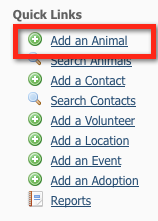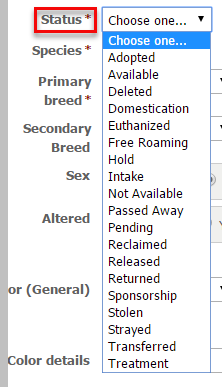Page History
Adding user roles for your volunteers
See the permissions section and the chapter About roles, security, and permissions for more information about roles for your volunteers. There are three primary roles associated with adding an animal:
- The Animal Admin role allows that volunteer to manage everything about all of the animals in the organization.
- The Animal Add role allows that volunteer to add animals.
- The Animal Foster Update allows that volunteer to manage all the information about their own foster animals.
| Tip |
|---|
We recommend you grant your trusted fosters the ability to manage their own foster animals ( Animal Foster Update). You can remove that role when they leave your organization. We also recommend that you have at least one volunteer with the role of Animal Admin. That person can oversee all the information about all the animals. |
Finding the "Add an animal" feature
There are four ways to find the Add an Animal feature.
| Panel |
|---|
Use the Add an Animal page to add new animals to your website. Remember that animals which are available for adoption are exported to the adoption listing websites and show up on your RescueGroups.org website automatically after you add them. Once animals are added to your website, you can start managing the information about them.
Click here to go to the Animals page.
| Tip | ||
|---|---|---|
| ||
You can find the Add an Animal page by going to Animals > Add an Animal or Animal List and click the Add an Animal button. |
A Few Ways to Add an Animal
| Panel |
|---|
1) from Animals > Add an Animal 2) from
|
| Tip |
|---|
To help you add animals faster, you may want to create one or more Animal Templates. Using the templates will fill in some of the fields for you automatically. See the Animal Templates section later in this User Guide. |
Required Fields
| Panel |
|---|
The only fields that are required by default when adding an animal are Name, Status, Species, and Primary Breed. All other fields can be left blank or unselected. However, your organization can set up custom required fields. Read more about custom Required Animal Fields later in this User Guide. |
Entering animal data
| Panel | ||
|---|---|---|
| ||
The Add an Animal fields include sections to help you enter all the animal's data. You may enter the information you have, save, and return to edit later. Basic InformationIn this section, you enter information such as the name, breed, sex, color, birthdate, and whether or not the pet has a special need. Certain of these fields are required. In order to save and return to the animal's description later, you must complete all the required fields. When you are doing an intake of an animal, you must enter a name. To help you choose a name, should you not have one yet, we've provided two options:
In the Status field, select the animal's status in terms of adoptable or not. By using the Status field, you enter data which you can later use to pull a report by status, for instance, all the animals which were trapped and released back to their feral colonies, or all the adopted animals. On intake, if the animal is immediately adoptable, select Available. In the Basic Information section, you also enter the animal's description. This field contains the basic editing functions you find elsewhere in your account. You can use boldface, italic, or underlined text to help you highlight specific information. You can change the font, size of the text, or color, and you can use a highlight color to draw attention to particular information. You can use bullet points or a numbered list, left, right, or center justify, and heading sizes to change the look of your descriptions. For instance, notice the changes to this description: font, type size, highlighting. In the Personality and Behavior section, you can highlight aspects of the pet's personality type. You can select as few or many as you want. The Compatibility section let's you select who your adoptable pet relates to best. The Administrative section is for your organization to enter information such as the date the animal was received, or the date the animal was made available for adoption, as well as the Foster's name, the location where the pet is staying, and the microchip number. The Sponsorship Options section lists information for soliciting sponoships for medical or maintenance purposes. The Adoption Options section allows you to enter the information from a completed adoption, such as the fee and the new owner. The Euthanasia Information is self-explanatory, and helps your organization track animals that had to be euthanized for medical reasons. Additional Notes and Comments allows your organization to keep private notes about the animal, list the origin, such as "Owner Relinquished," and any special needs the animal has. You can also list sponsors who have contributed to this animal's care. Custom Animal Groups Membership lets you place the animal into any special groups your organization may have created, such as "FM2978 Petco" or "Website only." Media is where you upload photos or videos of this animal. Export Accounts Selection allows you to export or share the animal. Sharing has to do with sharing to your partners, so if you have partners with whom you share animal information, this is where you decide which animals can be shared. |
Saving
| Panel | ||||||||
|---|---|---|---|---|---|---|---|---|
|






